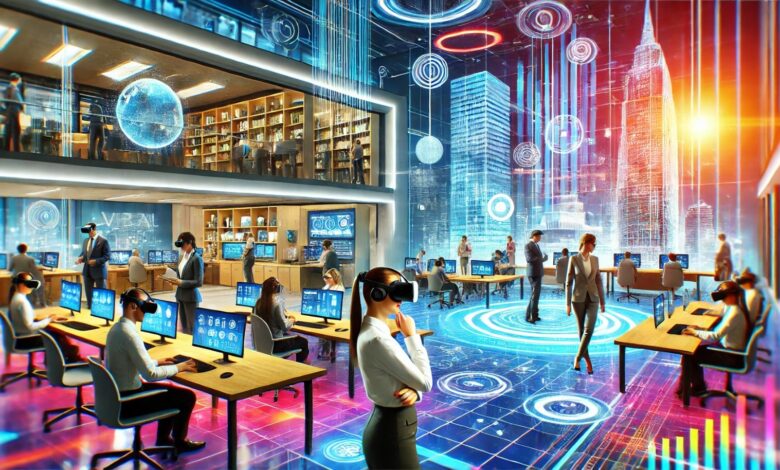
Imagine starting your first day at a new job, not by filling out forms in an office but by slipping on a VR headset and instantly stepping into a world where you explore your new workspace, meet your team, and even attend a welcome party—all from your living room. Welcome to the future of work, where Virtual Reality (VR) is no longer just for gamers but has become a game-changer for HR.
Picture this: A candidate logs into their VR headset and is transported into a vibrant, bustling digital version of your company’s headquarters. They explore every corner of the office as if they were physically there, attend a virtual team brainstorm, or even ‘bump into’ the CEO by the virtual water cooler. Instead of the standard, corporate video tour, this experience is like exploring a magical land, offering potential employees a fully immersive experience into your workplace culture.
This kind of interactive storytelling turns employer branding into something unforgettable. Candidates can “feel” what it’s like to be part of the company, making their decision to join feel more like an adventure than a leap into the unknown.
Onboarding is often a one-way street of presentations and PDFs. But VR transforms it into a hero’s journey. New hires are not passive participants but protagonists of their own onboarding stories. Imagine walking through a virtual office where each department is unlocked like levels in a video game.
Employees might embark on a scavenger hunt to discover the company’s hidden values or solve virtual puzzles that introduce them to key stakeholders. Instead of just meeting colleagues through static Zoom calls, they could be whisked into a simulated project room where they collaborate on real-life challenges using avatars, making learning about the company interactive, dynamic, and—dare we say—fun.
Training through VR is like entering “The Matrix” of workplace learning. Instead of listening to monotonous presentations or reading through dense manuals, employees enter a virtual simulation where they face real-world challenges. Picture a new hire in a virtual warehouse, learning to operate complex machinery in a risk-free digital environment. They can make as many mistakes as needed to get it right—without the fear of damaging equipment or jeopardizing safety.
It’s not just the practical, technical tasks that benefit. Customer service employees can simulate challenging interactions with customers in the virtual world, gaining critical experience before taking their first real call. VR training turns the mundane into a magical experience where learning feels more like a hands-on adventure.
In a world where remote work often feels isolating, VR is like creating a digital island where employees from all corners of the globe can meet, socialize, and collaborate in a shared virtual space. Think of it as a company metaverse where the break room is a tropical beach, brainstorming happens on the moon, and Friday happy hours occur in a cozy virtual café.
This sense of connection transcends geographical borders. Remote employees can attend virtual town halls, brainstorm in 3D spaces, or engage in light-hearted activities like virtual escape rooms or even meditative yoga in serene digital environments. The digital world becomes a playground where distance is no longer a barrier to camaraderie and collaboration.
Case Study Adventures of Indian Companies at the VR Frontier
TCS: The Architects of Digital Dreams
Tata Consultancy Services (TCS) has brought employer branding to the next level, offering virtual office tours that make Hogwarts look like a primary school. Candidates are treated to a journey through TCS campuses across India, discovering not just workspaces but the culture, vision, and pulse of the organization. This interactive experience creates an irresistible pull for top talent, transforming them from applicants into explorers.
Infosys: The Immersive Journey Begins on Day One
Infosys has adopted VR not just for onboarding but for crafting an onboarding saga. New hires don’t simply “meet the team”; they embark on a virtual journey through Infosys’ global offices, attend immersive leadership sessions, and dive into gamified training modules. It’s more than just a program—it’s an initiation into a world of innovation and possibilities.
Reliance Industries: Simulating the Future of Skill Development
Reliance Industries takes VR to the factory floor, using it to train employees in highly complex, technical tasks. Their VR training modules for refinery operations offer a sci-fi twist—employees practice critical skills in a hyper-realistic simulation. Here, mistakes are not costly but necessary, creating a safe environment to master dangerous or high-risk procedures.
Flipkart: Virtual Communities for Remote Warriors
At Flipkart, VR is the bridge between remote workers and the vibrant culture of the company. Remote employees engage in virtual team-building activities, attend all-hands meetings, and even relax at virtual social events. Imagine your remote office suddenly transforming into a carnival filled with games and challenges, fostering engagement in ways that regular video conferencing simply can’t match.
While the initial investment in VR technology might feel like scaling a mountain, the long-term benefits make it worthwhile. Imagine the competitive advantage of creating a workplace experience so immersive and engaging that employees can’t help but feel connected, skilled, and ready for action. As the costs of VR technology decrease and accessibility rises, these digital worlds may become as common as the internet itself.
VR is not just a cool gadget for HR professionals—it’s a portal to a future where work feels more immersive, inclusive, and engaging. From employer branding to training and community building, Virtual Reality is carving out a new frontier for HR practices, helping organizations attract and retain talent in an increasingly digital age. For companies ready to explore this brave new world, the adventure is just beginning.










